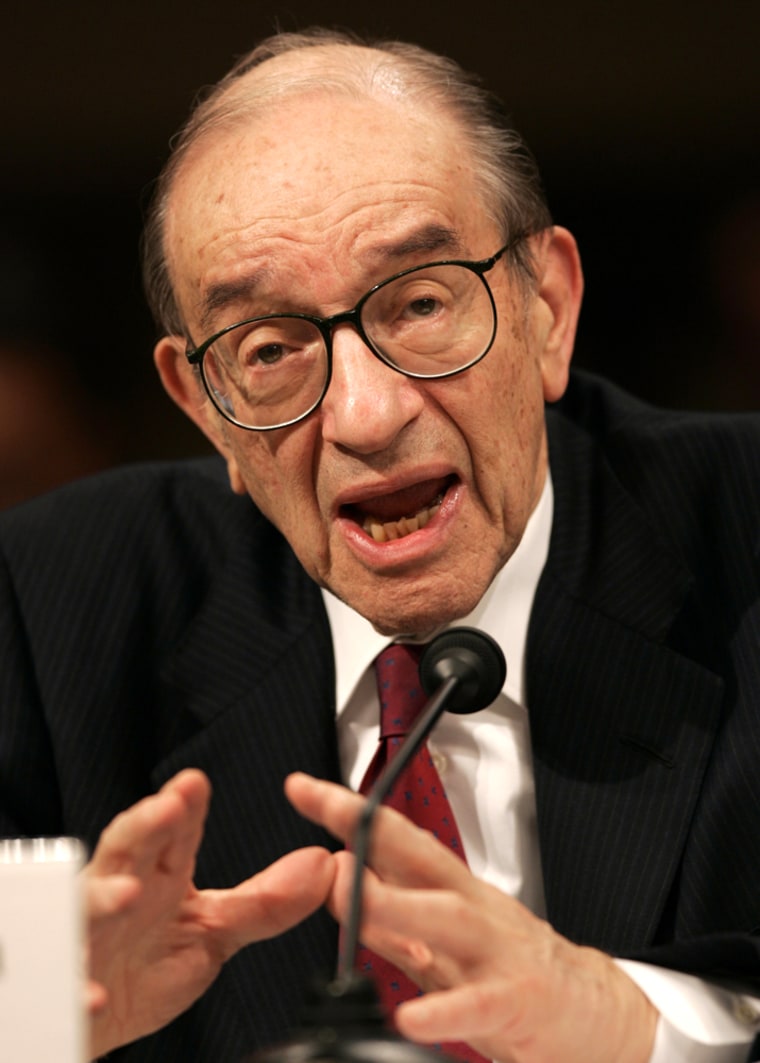Squaring off against Democratic critics of President Bush’s proposal to allow younger workers to put some of their Social Security tax payments into private retirement accounts, Federal Reserve Chairman Alan Greenspan gave his cautious but emphatic endorsement to private accounts Wednesday.
He called personal accounts within Social Security “a good thing to do over the longer run.”
What was striking about Greenspan’s three hours of testimony to the Senate Banking Committee was not his caution — that, after all, is the temperament of the Fed chairman — but his tenacity.
Repeatedly, he made the case that the current pay-as-you-go Social Security system does not work, due to what he called “inexorable” demographic changes, an “unprecedented potential increase in the number of people leaving the work force” by retiring.
“The existing structure is not working,” he told Sen. Jack Reed, D-R.I., who, like almost all congressional Democrats, opposes the private accounts idea.
The pay-as-you-go structure of Social Security, in which current workers pay for the benefits of current retirees, only works, Greenspan said, “if the population is growing sufficiently quickly, and longevity is growing only modestly.”
Essentially, he told the committee, America soon will have too few workers and too many retirees, with ever-increasing life spans.
No savings created
“Pay-as-you-go creates no savings,” he said. It “basically moves cash around.”
And he contended that private accounts within Social Security, which he described as a “forced savings” plan, would allow the U.S. economy to set aside savings to create capital investments which will pay for retirees’ living standards in future decades.
The crucial issue, he told Reed, is whether “we have the material goods and services that people will need to consume” in future decades.
Greenspan acknowledged that it is unclear how financial markets would react if the federal government borrowed the full cost of transitioning to a private accounts system. As a rough approximation, Greenspan used the figure of $1 trillion over 10 years for transition costs. He described the uncertainty of gauging market reaction as a matter of “not knowing and not knowing how to know.”
But he also suggested that in determining interest rates and bond yields, the financial markets may already have accounted for the $16 trillion in unfunded liabilities of the Social Security and Medicare programs.
The normally placid Greenspan rose almost to the threshold of passion as he made a class-based argument by contending that private accounts would allow low-income people to become mini-capitalists — in his view, a very good thing.
“When you have assets which you own, which you can bequeath to your children, (assets) which have your name on them, I think it is highly desirable thing, because you give wealth to people in lower- and middle-income groups who have not had it before,” he told a clearly skeptical Sen. Charles Schumer, D-N.Y.
The Fed chairman predicted private accounts would be “extraordinarily popular,” and “if they are I think it is a very important addition to our society because, as you know, I’ve been concerned about concentration of income and wealth in this country. ... This, in my judgment, is one way you can address that.”
Schumer on Tuesday gave a “pre-buttal” of Greenspan’s Wednesday morning testimony. His message: Even though Greenspan “is a tremendously respected figure and a great chairman of the Fed and he’s been my friend for a long time,” the public should not heed his advice on Social Security private accounts.
The idea of private accounts for younger workers, Schumer said, “is really a disguise by the ideologues who want to end Social Security, who hate government programs so much that they’ll do anything they can to stop them.”
Schumer adamant
Greenspan or no Greenspan, Democrats adamantly refuse to negotiate with Bush and congressional Republicans on private accounts. “Until privatization is taken off the table, no progress will be made,” Schumer said.
Greenspan’s testimony Wednesday came the morning after Sen. Lindsey Graham, R-S.C., revealed to reporters that the Fed chairman had been dispensing some helpful advice to him as tries to write a Social Security re-design bill that can gain bipartisan support.
Greenspan’s suggestion to Graham came on the topic of wage-indexing, the method the Social Security Administration uses to determine a retiree’s initial monthly benefit.
Currently Social Security adjusts the retirement benefit for real growth in the value of wages, which means benefits paid to future retirees will be worth more than those paid to today's retirees.
Social Security would save billions of dollars in future years if it switched to a price-indexed calculation, but that would impose a hardship on the worker with a career of relatively low earnings.
A Greenspan-Graham solution?
Greenspan and Graham may have a solution.
“Let’s devise a plan that is very sensitive to low- and moderate-income people,” Graham told reporters. “Instead of changing from wage-indexing to price-indexing or everybody, Alan Greenspan suggested to me that we look at wage growth for low-income workers, $30,000 or under, and consumer price indexing for the rest of us. That gives them (lower-income people) the most aggressive form of benefit growth.”
Voicing his admiration for the Fed chairman, Graham said, “He’s a real smart guy. … I met with him twice, I pick his brain, and he brought this up at the (Jan. 22) Alfalfa Club Dinner. ... He’s been involved with entitlement reform ideas for years.”
Graham said Greenspan “knows how my bill works because I explained it to him, and he said, ‘Why don’t you look at a progressive indexing system?’ And I think it’s a very good idea.”
By advising Graham, one of the key power brokers in the Social Security debate, Greenspan lent his economist’s prestige to the effort to devise a compromise bill that might pass.
Due to Senate filibuster rules which require 60 votes to shut off debate, Graham would need to enlist at least five Democrats to back his bill, assuming he could get all Republicans to support it.
